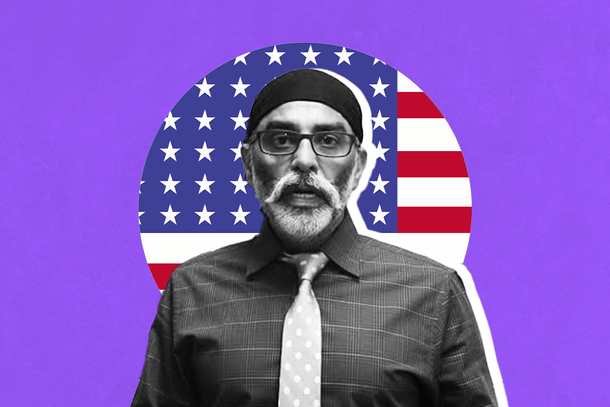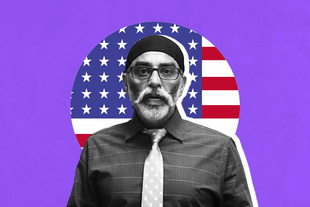World
WaPo's Dubious Journalism: Pannun Story Has US Deep State Fingerprints
R Jagannathan
May 02, 2024, 11:46 AM | Updated 12:06 PM IST
Save & read from anywhere!
Bookmark stories for easy access on any device or the Swarajya app.


The US media’s covert alignment with the US Deep State was nowhere more evident than in the way the Washington Post (WaPo) recently outed the name of a former Research & Analysis Wing (R&AW) official’s name in a case involving an alleged bid to assassinate a Khalistani terrorist, Gurpatwant Singh Pannun, on US soil.
It is a dubious piece of journalism and fully deserving of a term used only in India by the anti-Modi brigade: “Godi media”.
WaPo’s magnum opus (“An assassination plot on American soil reveals a darker side of Modi’s India”) reminds us of the use of targeted leaks before America launched its global war on terror.
After 9/11, the US mainstream media was fed stories by its spy agencies about Iraq’s non-existent WMD ('Weapons of Mass Destruction'), but the media did not question these leaks. It played second-fiddle to US strategic interests willingly.
The most tell-tale paragraph in the WaPo story is this one: “White House officials warned the Modi government this month (April) that The Post was close to publishing an investigation that would reveal new details about the (Pannun) case. It did so without notifying The Post.”
Four facts emerge.
One, the White House (and not just the spy agencies) knew WaPo was going to do a story on Pannun and R&AW. Let’s assume the spy agencies knew about it since a questionnaire may have been sent to it. But how did it know the publication would actually publish the story in advance? What if the investigations had led nowhere?
Two, Uncle Sam used this imminent WaPo report to pressure India to speed up the case and, possibly, utter a mea culpa or finish its own internal investigations into the Pannun murder plot shared with India. I won’t go into the details on the Pannun case here. You can read about it here, and also WaPo’s detailed story with more R&AW name disclosures here.
Three, since the name of the R&AW officer who allegedly sanctioned the murder was disclosed by WaPo, it could only have come from leaks in the spy agencies. The case pending before a US court only mentions CC1 as the R&AW officer involved in sanctioning the hit-job on Pannun.
Fourth, The Post says the US government spoke to the Indian government about the story, but claims “it did so without notifying The Post”. Really? The Post has to be notified about privileged US diplomatic communications to India? Clearly, this line, which had nothing to do with the story, was inserted to try and nip any suspicion that WaPo was fed the story by the US Deep State.
The WaPo finger-pointing not only names the R&AW official directly involved, but also mentions the names of the R&AW chief at that time, and National Security Adviser Ajit Doval. The report was allegedly written after WaPo spoke to more than “three dozen” current and former senior officials in the US, India, Britain, Canada, Germany and Australia.
That the story is biased is obvious from the way it refers to what may, at worst, be the targeting of separatists, as “harassment of Sikhs and other groups perceived as disloyal to the Modi government.” The Modi government, if anything, has been trying to build bridges with Sikhs, not trying to target them unless they are Khalistanis.
Funnily, while WaPo refers to India as “part of an expanding roster of countries employing tactics previously associated with China, Russia, Iran, Saudi Arabia and other repressive regimes”, it studiously avoids including the US (which has been busy eliminating its enemies abroad) and Israel in this list. That’s a glaring omission since both the US and Israel are known to assassinate their enemies whenever they can. The US has even assassinated its own citizens on foreign soil (Anwar Awlaki).
The WaPo report has all the hallmarks of a US spy agency-inspired story, and with the obvious purpose of lighting diplomatic fires under the Modi government one leaked story at a time. That very few of the over three dozen sources that WaPo allegedly talked to have been named goes without saying.
The only Indian quoted is A S Dulat, a former R&AW chief, who denied he had any inside knowledge of the Pannun assassination effort. But he still managed to say that R&AW usually took its orders from the NSA. The report notes that there is no “smoking gun” pointing towards Doval, but still surmises that such efforts in north America would have needed Modi’s quiet go-ahead.
WaPo clearly wants to point a finger at the “inner circle” of the Modi government.
The only bit of useful information in the WaPo story is the reference to R&AW agents who were active in Germany, the UK and Australia, and how some of them were asked to leave by local intelligence bosses for their aggressive efforts to infiltrate local anti-Indian groups.
The lessons India must learn from the WaPo article are these.
One, if we want to project power against anti-India forces abroad, we must do it more competently. The US has surveillance resources that are vastly superior to India’s.
It is more than likely that the US has deep sources within or close to our spy agencies. The sheer number of R&AW double-agents who fled to the US or North America after compromising India’s interests should worry the Modi government (read here).
Maybe, just maybe, it should be keeping more tabs on its own security people, and also seek information on how they may be compromised. It is very easy to get intelligence in India by merely promising placements in the Ivy League for the sons and daughters of bureaucrats and security officials.
Two, it is more than likely that the US spy network in India includes Pakistani assets, especially in some minority communities. This segment needs to be monitored very closely.
India has its work cut out to prevent the US from meddling in our security. During the P V Narasimha Rao period, the US managed to thwart a nuclear test as it got advance warnings on what might happen.
Its eyes in the sky and on the ground compromised us. By the time Atal Bihari Vajpayee took over, we had had learnt the lessons of the Rao period and the Pokhran tests in 1998 went smoothly without US interference.
We now must learn the lessons and remove the breaches in our security establishment, which are proving problematic.
Jagannathan is former Editorial Director, Swarajya. He tweets at @TheJaggi.





